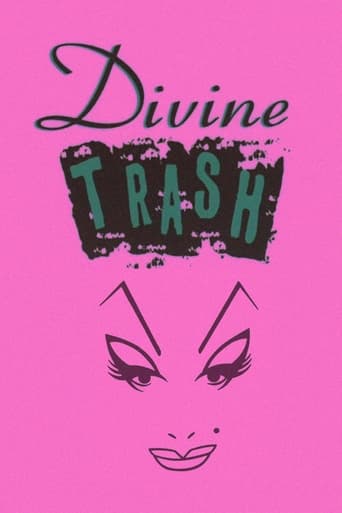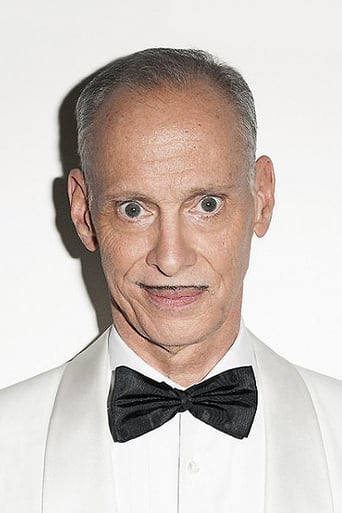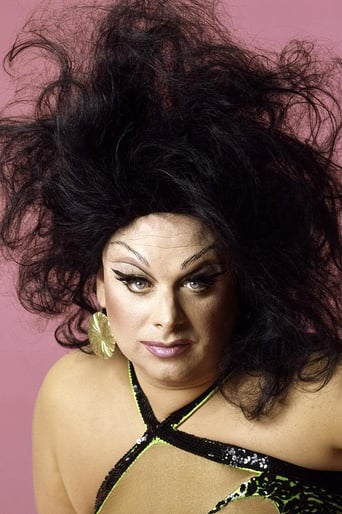

Divine Trash (2000)
The life and times of Baltimore film maker and midnight movie pioneer, John Waters.
Watch Trailer
Cast


Reviews
As Good As It Gets
Absolutely the worst movie.
This movie was so-so. It had it's moments, but wasn't the greatest.
There is, somehow, an interesting story here, as well as some good acting. There are also some good scenes
This documentary is about the influences that led to the films of John Waters as well as in-depth discussions of his early work. I particularly enjoyed seeing the parents of Waters and Divine's mother being interviewed because they seemed so normal and nice! Other interviews, the use of archival footage (for those who have since died, such as David Lochary, Divine and Edith Massey) and film clips all make up DIVINE TRASH.In viewing the documentary, you'd almost swear that Waters stopped making films after PINK FLAMINGOS--at least until he made PECKER two and a half decades later. I say this because almost no mention at all is made of any of the films in between other than a very brief clip from FEMALE TROUBLE and DESPERATE LIVING. I understand why this wasn't done--the film was only 96 minutes long, but it still seemed a bit remiss for neglecting to even mention the other films or talk about how the director made the odd transition from beyond the fringe to mainstream.However, I won't be a total party-pooper. What I did see, I really liked--but I was sure left wanting to see so much more as well as hear about his stock actors. Divine was discussed in some depth, but the others really seemed unimportant--and this is far from true.Maybe this should be made as a mini-series or perhaps have a sequel or two.
The various film clips show Waters' unique kind of freak-glamour -- to him (and to many of us as watch the films) these are the most glamorous people in the world. The films have always worked so well in part because they're silly and they're outrageous in a good-spirited way (Waters brilliantly points out that "Pink Flamingoes" is essentially a baby movie that would likely play well for Kindergarteners), but really in the sense that, as Paul Morrissey points out, they make fun of what's proper, thereby being quite serious films themselves, even though they're ludicrous -- and in such a way that it still seems outrageous today: a pretty girl with a penis; an obese man-woman being raped by a giant lobster, for instance. Perhaps no filmmaker has so reshaped the way we respond to sexuality by filming it -- Waters essentially takes the mick out of sex, whether straight, gay, consensual, forced, S&M, kink, or fetish.It's great to see Waters' and Divine's upright-seeming parents (neither of which have seen "Pink Flamingoes") and how positive they are, how supportive -- Waters' mother took him to play in junk yards as a kid. We're all rich because of that encouragement. And it's good to contrast how the parents react as opposed to one woman of similar age who worked for a censor board, and who, thirty years later, still can't get over a blasphemous crucifixion scene intercut with a "bead job" from one of Waters' early movies. (And while it certainly uses her for an example of extreme reactions to his films, the film never makes her into a "villain.") It's a nice choice to focus mostly on the early films, I think, as many of them aren't widely available and this can give us some sense of them.The work that Waters and Divine did together (his "inflated, insane Jane Mansfield"), I think, can stand alongside any of the great cinema partnerships, whether it's Cassavetes-Rowlands or Fellini-Mastroianni. Waters' own influences range from the camp Kuchar films to William Castle schlock antics to Bergman, Fellini, and Kenneth Anger (who, along with Russ Meyer, chose not participate in the film). And while it might be tempting to lump Waters in with the gay set, he isn't really a part of it -- it's more sexual "terrorism" than anything else; he's like a Surrealist in that sense. I think that's probably why his own influence is so far-ranging -- no one is safe in his films. 8/10
Spoilers herein.Yes, Waters was influential in encouraging independent talents like Jarmusch and Hartley just because of his presence. Yes, there was a time when revolting irony actually had a place. Yes, self-aware stoned parody seems a necessary sophomoric step for every kid.But that makes `Flamingos' of historical interest, not necessary worth watching today. It is more `Coven' than `Eraserhead.' And it is why this documentary is better than all Waters' films until `Pecker,' where he learned (and could afford) ironically detached than ironic irony rather than self-abusive voyeuristic pseudo-irony.The appearance of the now-retired film censor who encountered `Flamingos' is a cheap shot, sort of an afterglow from cheap wine: it works but at what cost?Irony is a much expanded concept in film because it forgives all. But the very existence of this documentary is very weird: it expands the notion and breaks it.The idea behind Waters' sort of shock-trash is that it is off-hand, disposable. To `document' it reverses that. To go further and celebrate its influence and permanence in film history sort of defeats the purpose. Its as if you celebrated a jazz solo by talking to the musician about fingering. Its all the more shocking when you discover that someone was filming the filmer in 1972. Ask: now why do that? And all the value deflates. Why do that? Because the shock value is what matters, not the destructive irony.Ted's Evaluation -- 2 of 3: Has some interesting elements.
If you haven't seen this yet, you don't know everything about John Waters and his films! Utilizing recent interviews with his surviving cast members (that alone should make you want to see this!); interviews circa 1972 with some of the same people and the dear departed David Lochary, Divine, and Edith Massey; behind-the-scenes footage from the set of "Pink Flamingos"; and scenes from such diverse influences as "Deep Throat" and "Sins of the Fleshapoids", "Divine Trash" is one of the best documentaries I've ever seen! I guess I'm a bit biased since I am a huge Waters fan, but this should also convert any budding Waters fan wondering what is so special about his films! Waters influences the Kochar brothers, H.G. Lewis, and Paul Morrissey are also interviewed, along with modern-day filmmakers influenced by Waters! Some of the best quotes are from Waters being interviewed himself and his bewildered parents, who seem to wonder how they could have raised such a weirdo! Plans were announced recently to put this onto DVD and I hope that counts for video as well, because I need to own this! A must-see!




